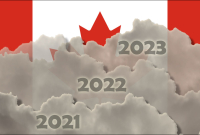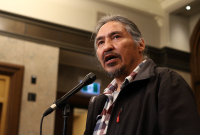Support strong Canadian climate journalism for 2025
Human-caused climate change is making heat waves much more likely, the federal government says, bringing extreme weather from fires to storms.
That's according to Environment and Climate Change Canada's rapid extreme weather event attribution system, which compares today's climate to a pre-industrial one.
Natural Resources Minister Jonathan Wilkinson said there will be more wildfires from British Columbia to Manitoba this month, with climate change fuelling them.
"It is not unusual for Western Canada to see high levels of fire activity this time of year," he said at a press conference on Monday.
"However, forecasting anticipates that activity will be above average in parts of the West to well above-average in areas in B.C. and Alberta."
Fire activity in September is also expected to be above normal.
There are 474 fires blazing across the country, compared to the roughly 900 fires at this time last year.
More than 150 of the fires — including in Jasper, Alta. — are considered out of control, with more than 3.4 million hectares burned so far this year. That is well above the 25-year average of area burned.
First Nations are disproportionately affected by those wildfires, said Jenica Atwin, parliamentary secretary to the minister of Indigenous Services, with 80 per cent of their communities at risk.
"This is a challenging summer, and I know that First Nations are anxious," she said. "But let me say this once again: Canada stands with you. We will be at your side before, during and after wildfires, and we will cover every single dollar of eligible costs that you encounter."
Even when conditions become less dry, Canadians have another thing to worry about: an above-average hurricane season.
"We are keeping a very close eye on developing storms and the potential impacts on Canadians," said Emergency Preparedness Minister Harjit Sajjan.
Sajjan is also urging Canadians to prepare for more major named storms this season, with the U.S.'s National Oceanic Atmospheric Administration predicting up to 24.
The remnants of Hurricane Debby swept through eastern parts of the country on Friday, leaving widespread damage from flash flooding.
Quebec officials said 14 municipalities were under a state of emergency Monday afternoon after the storm dumped up to 175 millimetres of rain on Montreal.
A man in his 80s died after he was swept into the Batiscan River. About 550,000 Hydro-Québec customers lost power during the storm.
"Make sure you have an emergency kit and a family emergency plan and set up your property for preparedness," Sajjan said.
"That means, for example, clearing dead trees or branches, ensuring your roofs, windows and foundations are in good repair, and considering installing storm shutters."
This report by The Canadian Press was first published Aug. 12, 2024.
— With files from Maura Forrest in Montreal





Comments
Of course the climate change deniers are scoffing at the idea that climate change is human caused. They spout garbage like it is a natural earth cycle, or that this is just more Justin Trudeau propaganda. It doesn't take a rocket scientist to see the changes that have occurred and relationship with the ever increasing CO2 levels we spew in the air. In addition, the same deniers are complaining about food prices and the cost of other goods, but ignore/deny there is a connection.
The deniers have their collective heads buried in the sand and believe too much of the misinformation on social media as fact. It seems we have a group of people who are incapable of fact checking and are into conspiracy theories.
But I am sure after more time and things become more extreme, they will be the first to demand more action and blame the government as they do now. They seems to be a group who blame everyone else for their own self created issues.
I predict that there will be great howls of "Why didn't you warn us?"
«Trop, c'est comme pas assez» (too much is just as bad as not enough). This French maxim is perfectly true right now. While western Canada has drought condition and a zillion forest fires, in Montréal, we just had our second episode of flooding in the streets and basement in less than a month (don't forget, Toronto also had one episode of flooding!). Last Friday, the tail end of hurricane Debbie dumped about 6 inches of rain on our heads in a few hours.
Climate change brings extreme conditions; what is really needed is an «average» in rainfall. We would gladly share our excess rainfall with the parched west!
I think that would be an excellent use of soon-to-be-retired oil pipelines! The east can ship rainwater west when we need it, the west can ship food east (in redesigned pipeline "pigs") when you guys need it, etc.